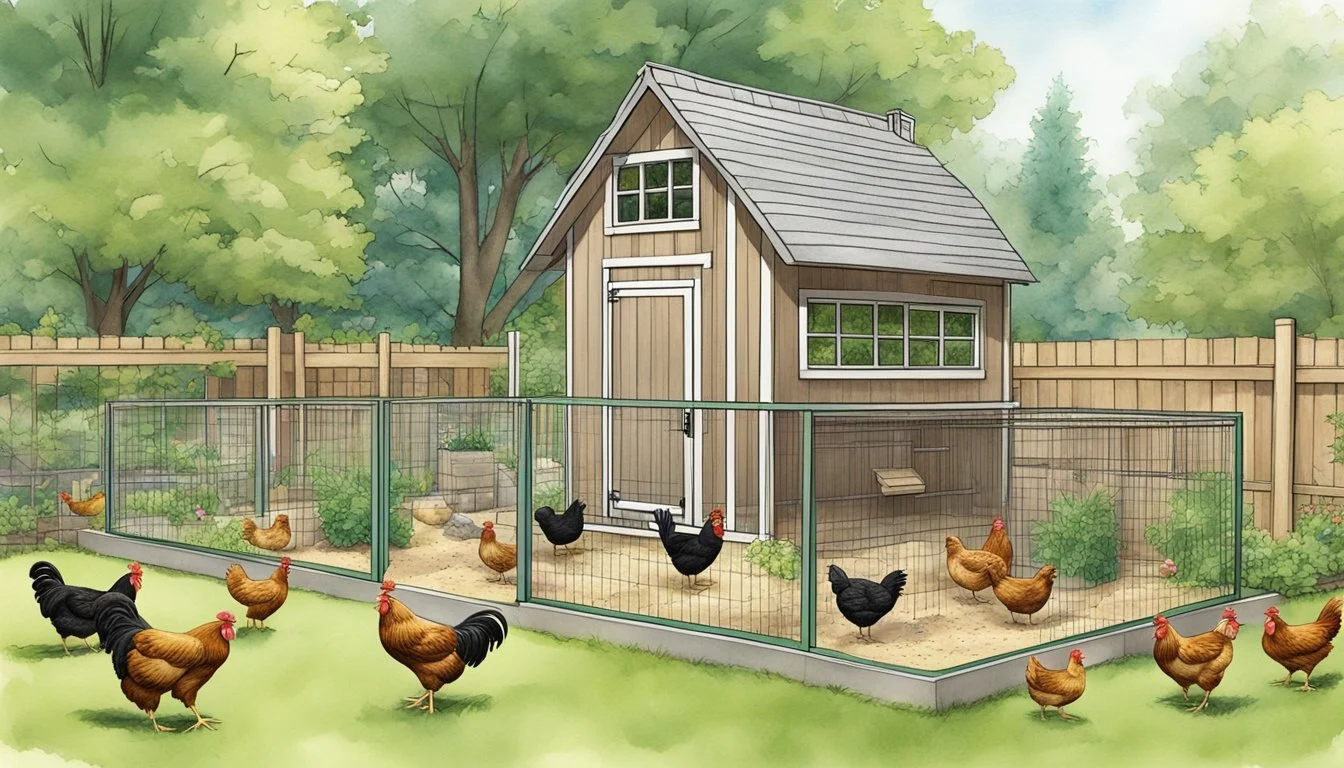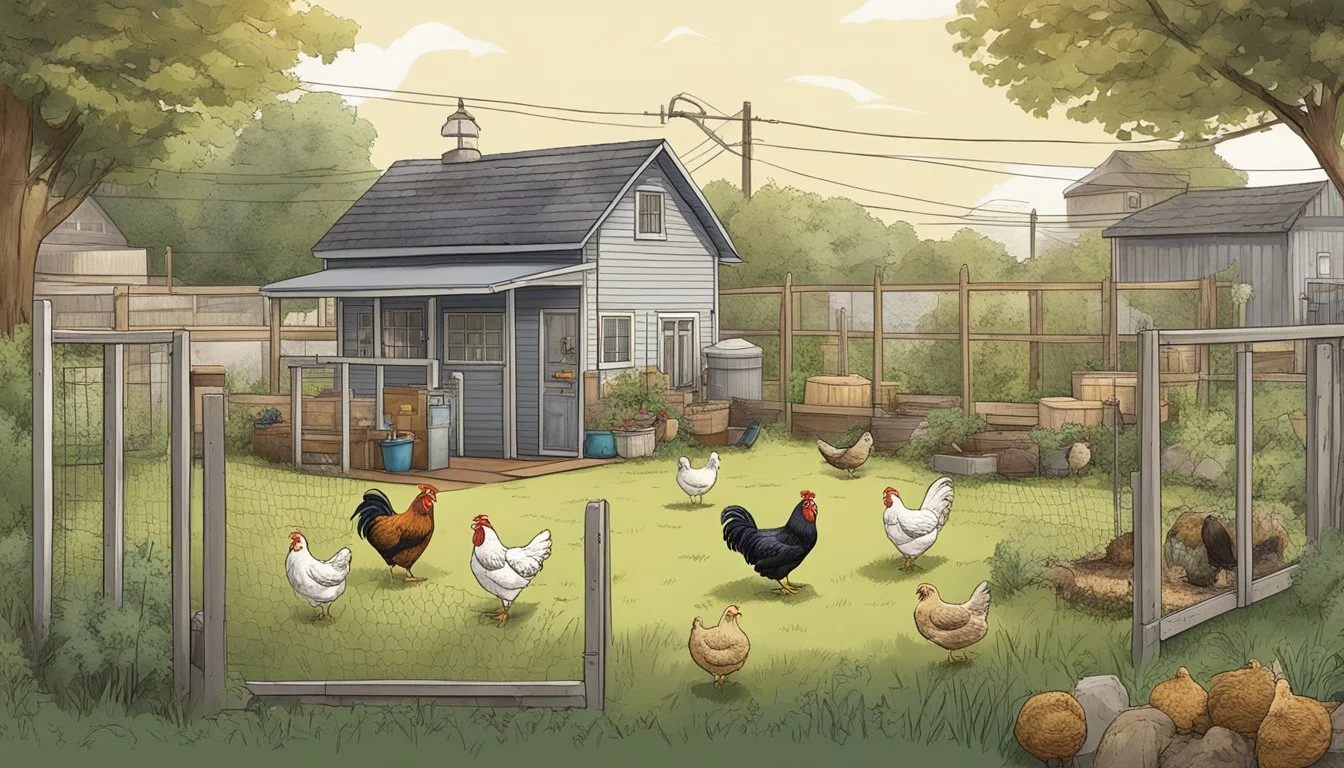Keeping Backyard Chickens in Des Moines, IA
A Practical Guide to Urban Poultry Farming
Backyard chickens have become a popular addition to many urban homesteads across the country, and Des Moines, Iowa, is no exception. With the growing desire for sustainability and local food sources, residents of Des Moines are turning to backyard chicken keeping as a means to connect with their food and embrace a more self-sufficient lifestyle. In Des Moines, this practice is regulated to ensure the well-being of the animals and the community, requiring prospective chicken keepers to navigate a set of ordinances formulated by the city.
In Des Moines specifically, individuals are permitted to keep chickens on their properties, but they must obtain a permit from the city's Zoning Department beforehand. This is a reflection of Des Moines' effort to balance urban life with agricultural interests, setting conditions that aim to respect both the needs of the chickens and the neighborhood dynamics. While chicken coops must be situated at least 25 feet away from neighboring residences, understanding and adhering to these regulations ensures that chickens can be a viable and harmonious part of residential areas in the city.
Understanding Local Regulations
For residents of Des Moines looking to keep backyard chickens, it's crucial to be aware of the city's municipal code. Adherence to local regulations ensures that your chicken-keeping is legal and respectful to neighbors.
Des Moines Chicken Ordinance
In Des Moines, keeping chickens is permitted within city limits under specific stipulations outlined in the city ordinance. Residential areas are governed by rules that disallow certain agricultural and nondomestic animals except for chickens, hens, rabbits, and other small fowl or animals under particular conditions.
Permit Requirements
A permit is mandatory for all residents who intend to keep chickens. This involves an application to the Des Moines Zoning Department with adherence to other stipulated guidelines. Without a valid permit, keeping chickens is against Des Moines regulations.
Number of Chickens and Space Requirements
According to Des Moines city code, the number of chickens allowed on a property correlates with the lot's acreage. The limit is typically 30 birds for lots smaller than 1 acre, and up to 50 birds for larger plots. Space requirements further mandate that any coop must be positioned at least 25 feet away from nearby dwellings to minimize disturbances to neighbors and prevent any potential issues with predators.
Zoning and Property Limits
Zoning regulations vary and can affect the legality of chicken keeping, with the city of Des Moines allowing chickens only in areas zoned accordingly. It is essential to verify with the local zoning authorities before setting up a coop. Additionally, fowl should not be kept in front yards and must observe the property line spacings set forth by municipal legislation.
Restrictions on Roosters and Other Fowl
In Des Moines, specific restrictions apply to roosters and other types of fowl including ducks and ferrets, mainly due to noise considerations. The laws are designed to minimize nuisance to residents and ensure that the keeping of such animals does not lead to conflicts within the community. It is prudent to check the city's municipal code for detailed restrictions regarding these animals.
Setting Up Your Chicken Coop
Before embarking upon the venture of backyard chicken keeping in Des Moines, IA, prospective chicken owners need to focus on proper coop setup. It is vital to adhere to the city's specific requirements regarding space, coop design, and predator-proofing measures to ensure the well-being of the chickens and compliance with local ordinances.
Choosing the Right Location
For the coop's location, Des Moines mandates a minimum setback of 25 feet from any neighboring dwellings to minimize potential nuisances. It is crucial to select a spot that provides adequate sunlight, natural shade, and protection from strong winds. The chosen location should also facilitate easy access to water and electricity if heat lamps or other appliances are necessary.
Coop Design and Construction
The coop must be designed to be robust and secure against predators while also being well-ventilated to keep the air fresh and deter the buildup of moisture. The construction materials should be durable to withstand Iowa's weather conditions. Each chicken requires a minimum of 3-4 square feet inside the coop, with additional space in the run for exercise.
Essential Coop Features
A chicken coop's essentials include:
Roosts: Properly-spaced horizontal bars where chickens can perch and sleep during the night
Nesting Boxes: One box for every 3-4 hens, filled with clean bedding for laying eggs
Ventilation: Windows or vents for air circulation, but secure enough to keep pests out
Security: Coops must be predator-proof with sturdy latches and impenetrable by animals such as raccoons
Maintaining a Clean and Healthy Environment
Maintaining a sanitary environment within the coop helps prevent the spread of diseases like coccidiosis and parasites like mites and lice. Consistent removal of waste and spent bedding, as well as incorporating methods like sand baths and composting, can keep the coop clean. Add employ regular coop inspections to catch and address any health issues promptly.
Raising Healthy Chickens
Raising healthy chickens in Des Moines, IA, requires attention to their daily care, protection from diseases and predators, and mindful breeding practices. Adherence to the city's guidelines, including permit acquisition, is equally important to ensure the welfare of the backyard flock.
Basic Chicken Care and Feeding
Proper care for chickens begins with a clean and well-constructed coop that provides shelter from the elements and enough space to prevent overcrowding. A Des Moines resident should provide a balanced diet consisting of commercial poultry feed and access to clean water. Chickens also benefit from the addition of grains, vegetables, and occasional protein sources like mealworms to maintain optimal health.
Routine Health Checks and Parasite Control
Regular health examinations are vital to detect early signs of disease or distress in chickens. Owners should look for abnormal behavior, changes in eating habits, or signs of respiratory issues. Controlling parasites such as lice and mites is critical; one can apply approved dusts or sprays to the birds and their environment. Keeping the coop and run area clean minimizes the risk of infestation and disease.
Breeding and Lifecycle Management
Responsible breeding involves selecting healthy hens and roosters to produce chicks. Knowledge of the breeding cycle and chick developmental stages can help backyard chicken enthusiasts manage their flock effectively. A pullet—a young hen—should not be bred until she is mature enough to handle the stress of egg production and rearing offspring.
Protection From Predators
To safeguard chickens from predators in Des Moines, a chicken coop must be sturdy and secure. Coop construction should include solid walls, a roof, and hardware cloth for ventilation windows. All entrances should be lockable to prevent access by raccoons, foxes, and birds of prey. Additionally, runs should have overhead netting or wire to protect chickens during the day.
Maintaining a healthy backyard flock of chickens in Des Moines centers on proper care, routine maintenance for parasites and health checks, meticulous breeding practices, and vigilant predator protection. All while adhering to regulations such as the number of birds permitted and obtaining the necessary permitting to raise chickens legally within the city limits.
Local Community Interaction
Residents of Des Moines, Iowa, engaging in backyard chicken keeping find that their experience is enriched through community interaction. This involves understanding ordinances, respecting neighbors, and participating in events that foster sustainable living.
Navigating Neighborhood Relations
Individuals should first consult the Des Moines Zoning Department to secure the required permits for chicken coops. Coops must be positioned at least 25 feet from any neighboring home to comply with city ordinances, addressing potential concerns such as smell and noise.
Noise ordinances are in place to ensure that the community's peace is not disturbed, especially if roosters are part of the backyard flock. Keeping open communication with neighbors can preemptively resolve concerns and contribute to a harmonious neighborhood environment.
Participating in Local Events and Exchanges
Engagement in local events presents an opportunity for chicken keepers to be active community members. The Des Moines Backyard Chicken and Poultry Group on Facebook serves as a platform for enthusiasts to share advice, trade supplies, and support local initiatives.
Monthly gatherings: A chance to meet fellow poultry enthusiasts.
Knowledge exchange: Learning opportunities from shared experiences.
Such interactions help novice chicken keepers to gain insights and build relationships with more experienced residents.
Contributing to Community Sustainability Initiatives
Backyard chicken keeping is more than a hobby; it is part of Des Moines's broader community development efforts. Residents can contribute to these sustainability initiatives by:
Producing eggs locally, reducing the carbon footprint.
Contributing organic waste to composting programs.
The local government and community development department often support these contributions to urban agriculture, enhancing the city's commitment to sustainable living and community resilience.
Legal Considerations and Future Planning
When keeping backyard chickens in Des Moines, IA, residents must navigate city ordinances and anticipate changes that may impact their chicken-keeping practices. Proper planning for the future of their flocks in terms of adjustments to laws, expansion, or commercial endeavors is essential.
Staying Updated on Changes to Chicken Ordinances
It is crucial for chicken owners to stay informed about the latest chicken laws and ordinances. The Municipal Code of Des Moines requires residents to obtain a permit for backyard chickens and adhere to specific regulations regarding the housing and number of animals. For example, coops must be 25 feet away from any neighboring residential dwelling. One must monitor the City of Des Moines official website or contact the city’s Zoning Department to receive the most current information regarding agricultural and nondomestic animal regulations.
Preparing for Expansion or Downsizing
Residents should plan carefully before changing the size of their flock. Considering the possibility of ordinance changes or personal circumstances, chicken keepers might find themselves in a position to either expand or downsize their flock. This preparation includes understanding potential space restrictions, especially within multiple dwelling areas where lot size may determine the legal number of chickens allowed.
Exploring Options for Commercial Use
For those considering transitioning from backyard chicken keeping to commercial use, it is imperative to understand that different regulations will apply. Municipal codes may change based on whether chickens are kept for personal or commercial purposes. An individual must obtain proper zoning clearances and permits pertinent to running a business from a residential dwelling or a commercial property, and also ensure that the operation adheres to all relevant city ordinances regarding health and safety.






